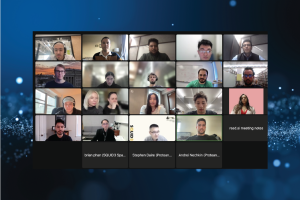
FastForward U’s accelerator programs continue to grow year over year. More than 50 student ventures applied for 10 coveted slots in the current spring Fuel cohort, making this one of the most competitive application cycles to date for the upper-level program.
Each semester, FastForward U assembles student cohorts from across all Johns Hopkins campuses and academic levels (undergraduate through postdoc) to build and refine their ventures. This semester, we had applicants from seven of the nine Johns Hopkins University schools.
The current cohort represents a diverse range of teams, as the program is industry agnostic. The 10 teams selected for the spring include:
- CellMind (Carey, M.B.A.): Developing a platform for next-generation cell therapy success. The company’s current focus is CAR-T therapy, which has been approved as a fourth-line treatment for blood cancers, but is still extremely risky. Improvements to this cell therapy are desperately needed, particularly innovative technologies tailored to this novel therapeutic class. Improved patient selection is critical to successful CAR-T outcomes and better patient health.
- ComPLEX DX (WSE undergrad): More than 14 million Americans experience acute respiratory illnesses annually. Misdiagnosis of these conditions leads to patients needing to retest multiple times, which creates a significant financial burden and delays time to treatment. We are creating a multiplexed respiratory pathogen detecting device that can detect up to 12 respiratory pathogens at once using one saliva sample in under 30 minutes.
- Evoked Haptics (WSE PhD and graduate student alumni): Delivers noninvasive and naturalistic illusions of touch for consumer and medical applications using a wearable electrical stimulator.
- Higher Grounds Vending (WSE, undergrad): With Higher Grounds Vending machines available 24/7 and strategically placed in convenient locations throughout campus, we will provide an accessible and affordable café experience, offering a variety of freshly brewed beverages at a lower price point than other on-campus cafés by utilizing the cost-saving benefits of vending machines, including no staff, minimal wait time and a wide service ground coverage.
- Ligane (KSAS, undergrad): The pace of pharmaceutical synthesis is limited by the human capacity to devise cost-effective reactions. Through Ligane, we aim to fulfill this need in ways competitors can’t via computerization without a large learning curve.
- Meloscene (Carey, M.B.A.): Meloscene’s spatial computing platform revolutionizes music creation into a collaborative and socially connected experience, featuring virtual studios where artists can co-create, share and grow within a supportive community. Seamlessly integrating popular tools with real instruments, our patent-pending technology streamlines workflows and enables musicians and fans to engage together in a creative, interactive process that fosters a vibrant and accessible music ecosystem.
- Periphero (Ph.D., SOM): Developed a long-acting, injectable drug delivery system for local, sustained release of insulin-like growth factor 1 to improve outcomes following peripheral nerve injury.
- Protean (WSE, graduate student): Creating modular robotic hardware and software for multiple applications.
- SQUID3 (WSE, graduate student): An LA-based satellite thermal control provider focused on software-definable solutions using aerospace-grade E-ink. Satellite manufacturers are still using outdated thermal technologies developed 20 years ago that struggle to meet the need for rapid and responsive satellite development. Our dynamic thermal tape solution aims to save manufacturers 40% of the thermal development cycle from mission to mission.
- WellCheq (SOE, postdoc): A web-based app that enables students to complete an emotional check-in. Our goal is to make it easier for students to ask for support, and provide educators with insight into the needs of their learners.
Recent alumni of Fuel have achieved major successes, including some fresh accomplishments from founders who joined in welcoming the new cohort:
- Somnair came in first place at the Arizona State University Innovation Open.
- Orbit, the winning team from the fall demo day, has raised hundreds of thousands of dollars in investment.
- Hubly Surgical has raised millions of dollars, and has been used in lifesaving procedures.
- Tunnel recently graduated from the Neo accelerator, and is now headquartered in New York City.
Many other Fuel alumni have gone on to participate in prestigious pitch competitions and accelerators/incubators, and today are operating in the black. Ventures that have completed Fuel are making positive differences in Baltimore and beyond, with patients and customers benefiting from innovative products and through economic development in the communities in which they headquarter.
The growth in interest in the Fuel accelerator indicates its successful approach in providing teams with support and guidance that foster rapid progress. During the semester, ventures go on the “hot seat,” where they receive critical feedback from their peers, and they also connect with alumni founders every week. Unlike other accelerators, there is not a formal curriculum, as needs look quite different depending on stage, industry and specific skills or gaps of team members. Ventures instead receive individualized supports from our strategic advisers and alumni mentorship connections. This semester, strategic advisers include Shreen Ghaleb and Fayez Ahmed, both Carey M.B.A. students who hold significant entrepreneurial expertise. Ghaleb and Ahmed also lead workshops on key topics including financial modeling, customer discovery, storytelling and more.
Fuel is run online in the spring, leading to applicants from around the globe. Even though Fuel is competitive, the FastForward U team ensures all students receive necessary supports, which may include interview and application debriefs, connection to other accelerators and incubators, funding opportunities, mentorship and more. Ventures who did not secure a slot can reapply in future semesters, and many do.
Stay tuned to learn about the spring cohort’s success and progress — and save the date for Fuel Demo Day: May 3, 2024!